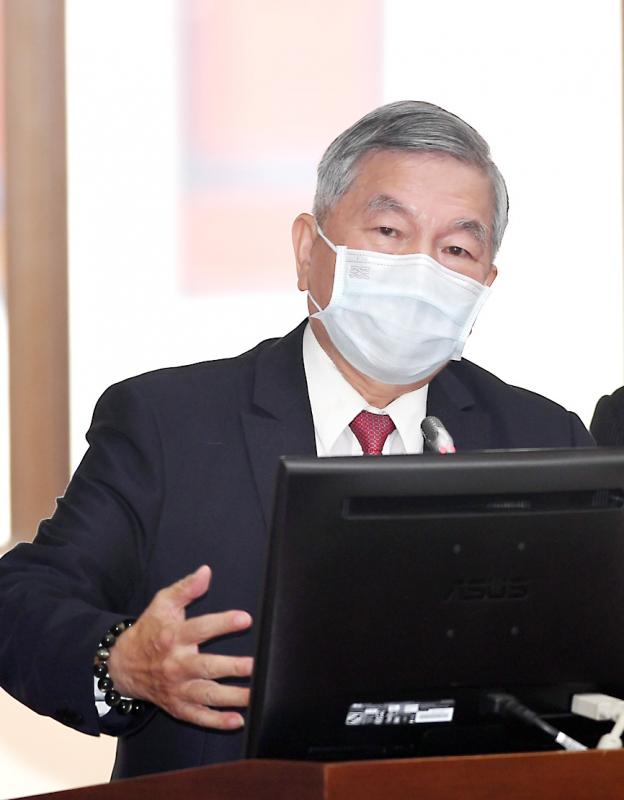Local medical equipment suppliers are soon to build a prototype of a ventilator to treat COVID-19 patients, Minister of Economic Affairs Shen Jong-chin (沈榮津) said yesterday.
Funding for the Ministry of Economic Affairs initiative is estimated at NT$50 million (US$1.67 million), which would come from the government’s expanded special budget that provides the ministry with an additional NT$77.44 billion, a report submitted to the legislature’s Finance Committee showed.
The ventilator, to be used for treating COVID-19 patients in a serious or critical condition, would be developed by local manufacturers based on a design by US medical device company Medtronic PLC, Shen told reporters prior to a committee meeting in Taipei.

Photo: CNA
Seeking to help nations combat the coronavirus, Medtronic last month publicly shared the design specifications of its Puritan Bennett 560 (PB560), a ventilator suited for a rapid manufacturing process.
“About 100 samples are to be built shortly, which would then be tested and certified,” Shen said, declining to give a more detailed time line.
Demand for ventilators for critically ill patients is high amid the global spread of the disease, making the domestic production of the devices an imminent need, as most manufacturers are in Europe and the US, Shen said.
Taiwanese manufacturers mainly produce positive-pressure ventilators for people with obstructive sleep apnea syndrome, while ventilators for critically ill patients are imported.
The project is headed by the government-funded Industrial Technology Research Institute (工研院), the ministry said.
“Our engineers are working on building a prototype along with local companies specializing in machinery sensors and components, as well as systems integration,” an institute official told the Taipei Times by telephone.
The official declined to confirm whether the ventilators would be based on Medtronic’s PB560.
The institute expects to hold a news conference next week to showcase the prototype, the official said.
Additional reporting by CNA

Taiwan is gearing up to celebrate the New Year at events across the country, headlined by the annual countdown and Taipei 101 fireworks display at midnight. Many of the events are to be livesteamed online. See below for lineups and links: Taipei Taipei’s New Year’s Party 2026 is to begin at 7pm and run until 1am, with the theme “Sailing to the Future.” South Korean girl group KARA is headlining the concert at Taipei City Hall Plaza, with additional performances by Amber An (安心亞), Nick Chou (周湯豪), hip-hop trio Nine One One (玖壹壹), Bii (畢書盡), girl group Genblue (幻藍小熊) and more. The festivities are to

Auckland rang in 2026 with a downtown fireworks display launched from New Zealand’s tallest structure, Sky Tower, making it the first major city to greet the new year at a celebration dampened by rain, while crowds in Taipei braved the elements to watch Taipei 101’s display. South Pacific countries are the first to bid farewell to 2025. Clocks struck midnight in Auckland, with a population of 1.7 million, 18 hours before the famous ball was to drop in New York’s Times Square. The five-minute display involved 3,500 fireworks launched from the 240m Sky Tower. Smaller community events were canceled across New Zealand’s

‘IRRESPONSIBLE’: Beijing’s constant disruption of the ‘status quo’ in the Taiwan Strait has damaged peace, stability and security in the Indo-Pacific region, MOFA said The Presidential Office yesterday condemned China’s launch of another military drill around Taiwan, saying such actions are a “unilateral provocation” that destabilizes regional peace and stability. China should immediately stop the irresponsible and provocative actions, Presidential Office spokeswoman Karen Kuo (郭雅慧) said, after the Chinese People’s Liberation Army (PLA) yesterday announced the start of a new round of joint exercises around Taiwan by the army, navy and air force, which it said were approaching “from different directions.” Code-named “Justice Mission 2025,” the exercises would be conducted in the Taiwan Strait and in areas north, southwest, southeast and east of Taiwan

‘SLICING METHOD’: In the event of a blockade, the China Coast Guard would intercept Taiwanese ships while its navy would seek to deter foreign intervention China’s military drills around Taiwan this week signaled potential strategies to cut the nation off from energy supplies and foreign military assistance, a US think tank report said. The Chinese People’s Liberation Army (PLA) conducted what it called “Justice Mission 2025” exercises from Monday to Tuesday in five maritime zones and airspace around Taiwan, calling them a warning to “Taiwanese independence” forces. In a report released on Wednesday, the Institute for the Study of War said the exercises effectively simulated blocking shipping routes to major port cities, including Kaohsiung, Keelung and Hualien. Taiwan would be highly vulnerable under such a blockade, because it